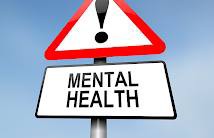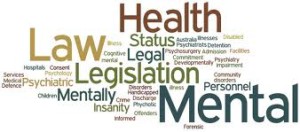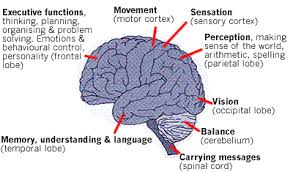..Social protection describes help and support designed to protect the vulnerable in society or at risk of hardship such as those affected by illness, family circumstances or age. The plight of the street mental health patient, challenges the said Ghanaian hospitality and middle-income accolades
The MenthGhana
The hard truth or should we say; reality, is that the Ghana’s mental healthcare is yes, totally broken down. This is my conservative observation as a Practice Nurse when I recently visited Ghana in February 2013 after some five years uninterrupted stay in the United Kingdom. This conclusion is based not on any scientific research but rather physical observation of the number of unrestricted frail and helpless mental health patients who roam in the major cities/towns or streets of Ghana.
This is more disheartening than the impression I formed when I went to Ghana in September 2002, as the situation in relation to the resolution of the challenging problems confronting mental health patients, their responsible institutions, agencies, families and relations, seem to be on the decay. It might be therefore; fictional, when on Saturday, 12 October 2013, the Ghana News Agency (GNA), reported Dr Akwasi Osei- the Chief Psychiatrist, as saying that Ghana’s current mental health service delivery, has a 97 per cent treatment gap- explaining that 97, out of a100 mental patients, who require health care, do not get it. This was said at the Mental Health and Wellbeing Conference under the theme: “Understanding Inclusion and Stigma Reduction” that was organised by the Mental Health Foundation- Ghana, with the support from the Australian Embassy in Ghana.
There are many ways of measuring the efficiency and timely intervention of mental healthcare challenges and disorders. In the United Kingdom, it has been found that pressure on psychiatric wards has become so great that doctors are sectioning mentally ill patients unnecessarily, because it is often seen as the only way to gain access to a bed, Members of Parliament have found. For example, the House of Commons Health Select Committee said it was shocked by “disturbing” evidence that it was becoming increasingly difficult for mental health patients to gain access to hospital on a voluntary basis, resulting cases of doctors declaring patients a risk to themselves and others in order to speed admittance to a ward. As had been the traditional practice around the world, in the UK, patients who are detained under the Mental Health Act can be held in hospital against their will for up to 28 days before further assessments that can extend their detention indefinitely.
We recognise that no one wants to point her father’s house with his/her left finger. Nonetheless when the reality appears miserable, sorry, pitiful, paltry, imperfect, pitiable, shame, mean, coarse, inferior, below par, subnormal, under average, second-rate, reduced, defective, deficient, lower, subordinate, minor, secondary, humble, second-rate, pedestrian, beggarly, homely, crumbling, fourth-rate, tawdry, petty, threadbare, badly made, less than good, unwholesome, lacking in quality, vile, disgusting, despicable, rustic, crude, outlandish, old-fashioned, odd, rock-bottom, garish, shaky, showy, inelegant, loud, unattractive, inartistic, affected, ramshackle, pretentious, tumble-down, glaring, artificial, flaunting, newfangled, out-of-date, crummy, junky, then as a health professional, I dare make humble contribution, hence the visitation of The MenthGhana Project.
In the words of Dr Akwasi Osei, a recent study showed that Ghana had 41 per cent prevalence of psychological distress in various degrees- meaning as many as 47 in a 100 admitted were under negative stress which affected them mentally and that 19 per cent of those with negative stress had moderate to severe symptoms meaning their problem was serious enough to be considered a mental illness. Yet mental health care was largely limited to the urban area and even more specifically to the middle and northern belts of the country with only three psychiatric hospitals and 12 practicing psychiatrists for the 25 million people. The beggarly, homely, crumbling, petty and the threadbare dilemma, it is said, required number of professionals for a low income country was 150. Dr Osei states that Ghana has 12, 700 psychiatric nurses instead of 30,000 and four clinical psychologists instead of a 100. “The field of mental health in Ghana is vast and the workers are few,” he said.
Whereas in the Kingdom of Great Britain the concerns, as reported by The Independent Newspaper (Wednesday 14 August 2013), had been that mentally ill patients are sectioned unnecessarily as ‘only way’ to a hospital bed, the contrary is the case of the Republic of Ghana. As highlighted in our introductory paragraph, the mental health patients in Ghana, it seems to JusticeGhana, are deliberately allowed to roam and without any laid down measures, to ease the immeasurable distress of families, relations, the responsible health professionals and indeed the society at large. This makes one to question the highly-flagged Ghanaian hospitality to foreigners not forgetting the newly-created ministry whose area of responsibility includes human dignity and social protection? Legally, it is internationally accepted that in majority of cases all compulsorily detained mental health patients, should be suffering from a mental disorder or ailment which warrants detention in hospital or a mental home in the interests of their own health or safety, or the safety of others.
We acknowledge that even in most wealthy nations, the possibility of coming in direct contact with detained mental health patients, breaking bounds from their homes into the streets and highways are real. Yet the deplorable state of most mental health patients, we often see in the streets of Ghana, many of them meeting their untimely death without our needed care or being given the necessary urgent attention, care and support, represent perhaps the general mindset that the Ghanaian hold about these citizens. The Independent Newspaper report on mental health patients quoted a UK Department of Health spokesperson as saying: “Vulnerable people deserve to be fully protected at all times, particularly when they need to be deprived of their liberty in their own best interests. However, there are still unacceptable variations across the country and we are working with the CQC, health services and local authorities to ensure that these protections are used whenever they are needed. We will take swift action where necessary to protect individual patients…We remain committed to improving mental health services for everyone and will consider this report carefully.”
In a study (Poor mental health in Ghana: who is at risk? (2009–2010), which sought to estimate the national prevalence of poor mental health in Ghana, and to explore how it correlates on a national level and aimed to examine associations between empowerment and poor mental health among women on the basis of epidemiological data on mental health and how it may be useful in understanding the scope of the problem in Ghana- targeting particular subgroups for interventions, Heather Sipsma1*, Angela Ofori-Atta2, Maureen Canavan1, Isaac Osei-Akoto3, Christopher Udry4 and Elizabeth H Bradley1, using the Kessler Psychological Distress Scale (K10) to measure psychological distress and assessed women’s attitudes about their roles in decision-making, attitudes towards intimate partner violence, partner control, and partner abuse, found that overall, 18.7% of the sample reported either moderate (11.7%) or severe (7.0%) psychological distress.
“We conducted a cross-sectional analysis using data from a nationally representative survey conducted in Ghana in 2009–2010. Interviews were conducted face-to-face with participants…We used weighted multivariable multinomial regression models to determine the factors independently associated with experiencing psychological distress for our overall sample and for women in relationships. Psychological distress is substantial among both men and women in Ghana, with nearly 20% having moderate or severe psychological distress, an estimate higher than those found among South African (16%) or Australian (11%) adults. Women who are disempowered in the context of intimate relationships may be particularly vulnerable to psychological distress. Results identify populations to be targeted by interventions aiming to improve mental health.”
Born and bred in Ghana, I cannot be ignorant about the hassles of women and of course men in our major cities/towns and streets in making ends meet amid decongestion policies. The JusticeGhana Samaritan Street Project has had the chance of speaking to some of these street hawkers about this policy often referred to in Accra as “aba yee”- namely, the taskforce personnel deployed in our metropolis to ensure marketing or hawking-free street. Some of the women we spoke to in Accra and Madina confer to us that their partners were either unemployed or earn not enough to confront the collective financial challenges of their families. Majority of the street or station hawking youth complain of unemployment or vocational training. It came as no surprise to The Samaritan Street Project- The MenthGhana, to discover that there are indeed a glaring competing number of both men and women with mental health problems- both within the youthful and the elderly population.
WHAT CAUSES MENTAL ILLNESS?
In Ghana, as it is true of most African cultures, the causes of mental illness could have many definitions or interpretations. Mindwsie, however, writes that most mental health professionals believe that there are a variety of contributing factors to the onset of a mental illness. Research shows that there are physical, social, environmental and psychological causes for mental illness.
On physical causes (Biological factors)- it is found that each individual’s own genetic make-up can contribute to being at risk of developing a mental illness and traumas to the brain (via a form of head-injury) can also sometimes lead to changes in our personality and in some cases ‘trigger’ symptoms of an illness. The most cited instance is Misuse of substances (such as alcohol or drugs) and deficiencies of certain vitamins and minerals in an individual’s diet can also play a part. In relation to Social and environmental causes (Factors around us), it is found that where someone lives and their living conditions along with family and community support networks can play a part along with employment status and work stresses. Living in poverty or social isolation, being unemployed or highly stressed in your work can all put pressure on an individual’s mental health.
The psychological factors (Your Psychological state) Coping with past or current traumatic experiences such as abuse, bereavement or divorce will strongly influence an individual’s mental and emotional state which can in turn have an influence on mental health. On family history, there is evidence to suggest that heredity can play some part in the development of some forms of mental illness. However like with many physical health conditions (such as Heart Disease or Diabetes) it is suggested that the fact that a family member has experienced a mental illness does not necessarily mean that all other genetic family members will experience the same condition and that as with physical health conditions, the other factors shown above will indeed play a significant part too.
At the national launching of this year’s World Mental Health Day- dubbed: “Mental health and older adults”, on 10 October 2013, at Koforidua, Dr Akwasi Osei who also formally launch the “Restoring Dignity Project” which advocates for the re-integration of cured mental patients into the society said that last year, the three mental hospitals in Ghana handled 99,994 patients, while community mental health nurses attended to 260,000 patients. According to Professor Joseph Bediako Asare- former Chief Psychiatrist, he was happy that there was a law in place and advised implementing institutions to ensure that the right structures were created to ensure effectiveness and efficiency. The Australian High Commissioner, Ms Joana Adamson, praised Francis Acquah- a Ghanaian Mental Health Nurse in Australia and President of the Mental Health Foundation Ghana, for his drive and commitment to raise awareness and improve the situation of persons living with mental health illness. She revealed that in Australia, one out of five people suffered some form of mental illness and that half of the population could also experience mental illness during their lives.
HOW IS MENTAL ILLNESS DIAGNOSED?
There are no ‘tests’ as such, for mental illnesses. Unlike diseases such cancers, heart disease or diabetes, mental health problems cannot be diagnosed by checking the blood or body fluids of the person experiencing symptoms, as would be the case with a physical health condition. However, a diagnosis, per Mindwsie, will usually be made by an experienced psychiatrist working with other health professionals after a period of observation of the individual to identify symptoms. A person’s medical history and recent life events will also be taken into consideration so as to ensure a correct and accurate diagnosis. More often than not, family and friends play an important role by discussing changes they have noticed in an individual’s behaviours. A check of the person’s physical health will also be necessary to ‘rule out’ any symptoms that could be contributed to a physical condition.
The Minister of Health- Ms Sherry Ayittey is therefore right in calling for community sensitisation campaigns to create public awareness on the fact that mental disorders were preventable and treatable, so as to encourage families to take better care of their relations with mental challenges.
It is medically established that no one could be expected to be able overcome mental health problems without support and that asking for this must not be seen as a sign of weakness as it takes great strength and courage to reach out and ask for help. The first step in this direction as Mindwsie points out is to reach out and talk to someone about what you are experiencing whether that is to be a friend, partner, family member or your doctor. Thus although for most people, going to the doctors can generate series of anxieties and frustrations, but seeking out professional help will be the first step in terms of understanding and learning to live with and recover from, mental illness.
Research shows that people with mental illnesses or disorders may experience a wide range of symptoms which can vary in their severity. For example, anxiety may be mild, or so severe that the person affected finds it impossible to concentrate on their work, watch TV, or perhaps will be unable to leave their home for months or have difficulty sleeping, feeling hopelessness or guilt, or believing that other people are plotting against you – but as with anxiety, Mindwise writes that the extent to which different individuals are affected by these symptoms can vary enormously. “for example, someone with a chest infection is likely to find that their breathing is affected causing them some discomfort, whilst someone with schizophrenia may experience hallucinations which may cause them anxiety and problems concentrating. People with different illnesses or disorders will have different illness experiences, including; the types of symptoms experienced; how daily life and ability to function ‘normally’ is affected and what types of treatment may be effective.”
While some people might have groups or ‘clusters’ of symptoms like schizophrenia or manic depression (otherwise known as bi-polar disorder), “these two conditions both involve episodes of psychosis which can result in the person affected losing touch with reality because their thinking or mood has been disturbed- they may hear voices or see, taste or smell things which are not real, or develop strange beliefs, perhaps that they are being pursued by aliens or the mafia. Or they might experience very high or low moods which have a strong effect on the way they behave. Some people will only ever experience a single ‘psychotic episode’, while others will have recurring periods of problems, perhaps at times of particular stress in their lives.” Thus, the types of symptoms we are experiencing are vital not only in helping the health professionals to diagnose the condition we have but also, can help to establish the right treatment for a particular condition in order to give us the best chance of a successful recovery. For example, within the health profession, dual diagnosis describes people who have mental health problems and drug or alcohol problems.
The mental health problems may include schizophrenia, depression, bipolar disorder or Personality Disorder. It is said that having a mental health diagnosis significantly increases our risk of misusing alcohol and drugs. Research carried out by the Royal College of Psychiatry (2002) found that people with a diagnosis of schizophrenia are more likely to misuse alcohol. They are also 6 times more likely to use street drugs (Chrome, 2003). The following psychiatric problems are common in dual diagnosis: Depressive disorder such as depression and bipolar disorder; Anxiety disorders including generalised anxiety disorder or panic disorder; Obsessive Compulsive Disorder and phobias, not forgetting other psychiatric disorders such as schizophrenia and Personality Disorders.
It is said that whereas the use of legal drugs like caffeine, nicotine, or alcohol is socially acceptable in some situations, encouraged, for some, their misuse (i.e. use that is problematic or which leads to harmful behaviour), can yes, also act as a contributory factor to the development of a mental illness.
THE WAY FORWARD
Like in most illnesses, delays in early detection, treatment and support for the patient can cause distress, increase the risk of relapse and can be harmful for the individual and their friends; family and carers. Early treatment has been shown to improve the long-term course of psychosis. If left untreated, the impact of an individual’s life including their relationships, studies and employment may be greatly disrupted, especially, at the critical stages of a young person’s life, adolescence and young adulthood when they are making plans for their carer and future. Ability to treat psychosis early greatly increases the person’s odds of being able to enjoy a healthy and productive future.
CONCLUSION
With the Mental Health Act 846 of 2012; which calls for better integration of mental health into the Ghanaian National Health Services, Ghana- is being credited for making substantial advancement in mental healthcare. I report however, that the prevalence as the gates of mental home in Asylum Down, Accra, illustrates, is a broken safety- net, lacking in a minimum decent standard of dignity.
Compiled By Gina Kuukua Amoakwa-Fordjour for The JusticeGhana Samaritan Street Project- “The MenthGhana”.




